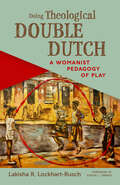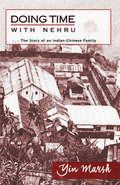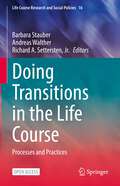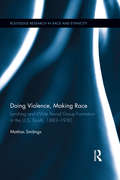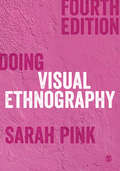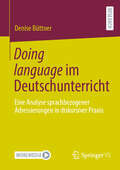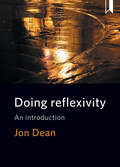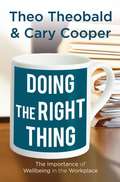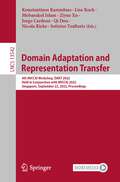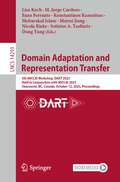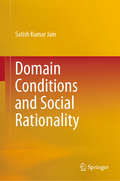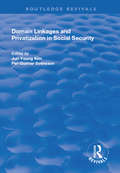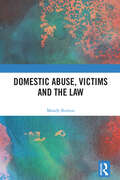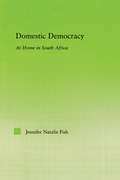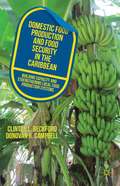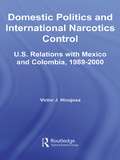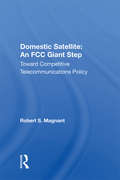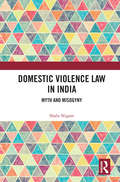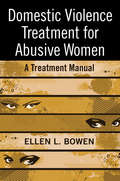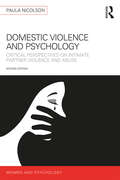- Table View
- List View
Doing Theological Double Dutch: A Womanist Pedagogy of Play
by Lakisha R. Lockhart-RuschEmbodied womanist play brings us closer to ourselves, to others, and to the divine. In this remarkably innovative book, Lakisha R. Lockhart-Rusch offers a fresh vision for theological education rooted in the embodied insights of Black women. Acknowledging the historical reality that play has often been a privilege reserved for those in power, Lockhart-Rusch shows how play has nonetheless functioned as a hidden space of agency, healing, and resistance for Black women. Using the game of Double Dutch as an extended metaphor, she demonstrates how a womanist pedagogy of play offers a transformative encounter with the love of self and of God for students from all backgrounds. Coupling theory with practical tools, this book equips theological educators to teach across difference for the liberation of all.
Doing Time with Nehru: The Story of an Indian-Chinese Family
by Yin MarshThe midnight knock on the door and the disappearance of a loved one into the hands of authorities is a 20th-century horror story familiar to many destined to "live in interesting times." Yet, some stories remain untold. Such is the account of the internment of ethnic chinese who had settled for many years in northern india. When the Sino-indian Border War of 1962 broke out, over 2,000 chinese-indians were rounded up, placed in local jails, then transported over a thousand miles away to the Deoli internment camp in the Rajasthan Desert. Born in calcutta in 1949, and raised in Darjeeling, Yin Marsh was just thirteen years old when first her father was arrested, and then she, her grandmother and her eight-year-old brother were all taken to the Darjeeling Jail, then sent to Deoli. ironically, Nehru - India's first Prime Minister and the one who had authorized the mass arrests - had once "done time" in Deoli during india's war for independence. Yin and her family were assigned to the same bungalow where Nehru had also been unjustly held. Eventually released, Marsh emigrated to America with her mother, attended college, married and raised her own family, even as the emotional trauma remained buried. When her own college-age daughter began to ask questions and when a friend's wedding would require a return to her homeland, Yin was finally ready to face what had happened to her family.
Doing Transitions in the Life Course: Processes and Practices (Life Course Research and Social Policies #16)
by Barbara Stauber Andreas Walther Richard A. SetterstenThis open access book provides a unique research perspective on life course transitions. Here, transitions are understood as social processes and practices. Leveraging the recent “practice turn” in the social sciences, the contributors analyze how life course transitions are “done.” This book introduces the concept of “doing transitions” and its implications for theories and methods. It presents fresh empirical research on “doing transitions” in different life phases (e.g., childhood, young adulthood, later life) and life domains (e.g., education, work, family, health, migration). It also emphasizes themes related to institutions and organizations, time and normativity, materialities (such as bodies, spaces, and artifacts), and the reproduction of social inequalities in education and welfare. In coupling this new perspective with empirical illustrations, this book is an indispensable resource for scholars from demography, sociology, psychology, social work and other scientific fields, as well as for students, counselors and practitioners, and policymakers.
Doing Violence, Making Race (Routledge Research in Race and Ethnicity)
by Mattias SmångsThe subject of lynching has spawned a vast body of important research, but this research suffers from important blind spots and disjunctures. By broadening the scope of research problem formulation, staking out new theoretical-analytical tracks, and drawing upon recent innovations in statistical methodology to analzye newer and more detailed data, Doing Violence, Making Race offers an innovative contribution to our understanding of this grim subject matter and its place within the broader history and sociology of US race relations. Indeed, this volume demonstrates how different forms of lynching fed off and into the formation of the racial group boundaries and identities at the foundation of the Jim Crow system. The book also demonstrates that as dominant white racial ideologies and conceptions took an extremist turn, lethal mob violence against African Americans increasingly assumed the form of public lynchings, serving to transform symbolic representations of blacks into social stigma and exclusion. Finally, Smångs also explores how public lynchings were expressive as well as generative of the collective white racial identity mobilized through the southern branch of the Democratic Party, whilst private lynchings were related to whites’ interracial status and social identity concerns on the interpersonal level. The most complete and complex scholarly treatment of this grim subject to date, this enlightening volume will be of interest to undergraduate and graduate students interested in areas such as Sociology, Political Science, History, Criminology/Criminal Justice, Anthropology, American Studies, African-American and Whiteness Studies.
Doing Visual Ethnography
by Sarah PinkThis book is the definitive guide to understanding and doing visual ethnography. Sarah Pink’s landmark text provides you with both the critical theoretical foundations and the creative tools and techniques you need to conduct your own visual ethnography. Covering the material and the digital, and tying key concepts and ideas to real world contexts throughout, this fully updated fourth edition: Provides clear and critical guidance on research planning and ethics Discusses new and emerging technologies, including digitally connected devices and wearable cameras. Introduces contemporary methods such as futures ethnography, distance ethnography, team ethnography, and the use of documentary. Explores the latest theory and practice in photographic and video ethnography. Shows you how visual ethnography can be applied, participatory, and even interventional. A milestone in visual and ethnographic research, this book is a must-have for students and researchers across the social sciences. It is an essential invitation, and companion, to doing impactful, creative, and critical visual research.
Doing Visual Ethnography
by Sarah PinkThis book is the definitive guide to understanding and doing visual ethnography. Sarah Pink’s landmark text provides you with both the critical theoretical foundations and the creative tools and techniques you need to conduct your own visual ethnography. Covering the material and the digital, and tying key concepts and ideas to real world contexts throughout, this fully updated fourth edition: Provides clear and critical guidance on research planning and ethics Discusses new and emerging technologies, including digitally connected devices and wearable cameras. Introduces contemporary methods such as futures ethnography, distance ethnography, team ethnography, and the use of documentary. Explores the latest theory and practice in photographic and video ethnography. Shows you how visual ethnography can be applied, participatory, and even interventional. A milestone in visual and ethnographic research, this book is a must-have for students and researchers across the social sciences. It is an essential invitation, and companion, to doing impactful, creative, and critical visual research.
Doing language im Deutschunterricht: Eine Analyse sprachbezogener Adressierungen in diskursiver Praxis
by Denise BüttnerDie Studie leistet einen empirisch-rekonstruktiven Beitrag zu einer machtkritisch ausgerichteten Fachdidaktik. Sie fokussiert den Deutschunterricht und die darin stattfindenden Interaktionen als diskursive Praxis, in der ein spezifisches Wissen in, über und angesichts von Sprache relevant gemacht wird. Für Subjektivierung ist jenes Wissen hochgradig wirkmächtig und bleibt den Akteur*innen im Prozess der schulischen Enkulturation doch größtenteils unbewusst. Darin liegt ein hohes Potential für die institutionelle (Re-)Produktion von Linguizismus.Vor diesem Hintergrund eröffnet die Studie einen Blick auf sprachbezogene Adressierungen, die in charakteristischer Weise vom Fach selbst ausgehen. Sie werden in (fach)didaktischen und pädagogischen Programmatiken breit kommuniziert und zeichnen sich bis auf die Ebene unterrichtlicher Praktiken ab. Um das Zusammenspiel von fachspezifischer Adressierung und Praktiken des ‚doing language‘ möglichst eng aufeinander beziehen und in rekonstruktionslogisch plausibilisierte Zusammenhänge bringen zu können, liegt der Arbeit ein wissenssoziologisch-diskursanalytischer Ansatz zugrunde.
Doing reflexivity: An Introduction
by Jon DeanReflexivity is vital in social research projects, but there remains relatively little advice on how to execute it in practice. This book provides social science researchers with both a strong rationale for the importance of thinking reflexively and a practical guide to doing reflexivity within their research. The first book on the subject to build primarily on the theoretical and empirical contributions of Pierre Bourdieu's reflexive work, it combines academic analysis with practical examples and case studies, drawing both on recent reflexive research projects and original empirical data from new projects conducted by the author. Written in an engaging and accessible style, the book will be of interest to researchers from all career stages and disciplinary backgrounds, but especially early-career researchers and students who are struggling with subjectivity, positionality, and the realities of being reflexive.
Doing the Right Thing
by Theo Theobald Cary CooperA common metaphor for modern life is 'keep the plates spinning', but it is becoming increasingly hard to balance professional and private lives, and this takes its toll. The authors examine the working relationship between the organisation and employee, and establish new ways that managers can broker a better deal for all concerned.
Doing your Research Project in Sport (Active Learning in Sport Series)
by Chris LynchThe research project is a major component of most higher education sport courses. While undertaking a research project can be an exciting and rewarding experience, it can all too easily lead to stress and disappointment. Mistakes made early in the process – in the design of experiments, for example – can lead to frustration later on. This accessible book guides students through the process, from the initial stages of research (identifying problems and designing questions) right through to the presentation of their findings.
Domain Adaptation and Representation Transfer: 4th MICCAI Workshop, DART 2022, Held in Conjunction with MICCAI 2022, Singapore, September 22, 2022, Proceedings (Lecture Notes in Computer Science #13542)
by Jorge Cardoso Nicola Rieke Ziyue Xu Konstantinos Kamnitsas Lisa Koch Qi Dou Sotirios Tsaftaris Mobarakol IslamThis book constitutes the refereed proceedings of the 4th MICCAI Workshop on Domain Adaptation and Representation Transfer, DART 2022, held in conjunction with MICCAI 2022, in September 2022. DART 2022 accepted 13 papers from the 25 submissions received. The workshop aims at creating a discussion forum to compare, evaluate, and discuss methodological advancements and ideas that can improve the applicability of machine learning (ML)/deep learning (DL) approaches to clinical setting by making them robust and consistent across different domains.
Domain Adaptation and Representation Transfer: 5th MICCAI Workshop, DART 2023, Held in Conjunction with MICCAI 2023, Vancouver, BC, Canada, October 12, 2023, Proceedings (Lecture Notes in Computer Science #14293)
by M. Jorge Cardoso Sotirios A. Tsaftaris Enzo Ferrante Nicola Rieke Konstantinos Kamnitsas Lisa Koch Dong Yang Mobarakol Islam Meirui JiangThis book constitutes the refereed proceedings of the 5th MICCAI Workshop on Domain Adaptation and Representation Transfer, DART 2023, which was held in conjunction with MICCAI 2023, in October 2023. The 16 full papers presented in this book were carefully reviewed and selected from 32 submissions. They discuss methodological advancements and ideas that can improve the applicability of machine learning (ML)/deep learning (DL) approaches to clinical setting by making them robust and consistent across different domains.
Domain Conditions and Social Rationality
by Satish Kumar JainThis book primarily focuses on the domain conditions under which a number of important classes of binary social decision rules give rise to rational social preferences. One implication of the Arrow and Gibbard theorems is that every non-oligarchic social decision rule that satisfies the condition of independence of irrelevant alternatives, a requirement crucial for the unambiguity of social choices, and the weak Pareto criterion fails to generate quasi-transitive social preferences for some configurations of individual preferences. The problem is exemplified by the famous voting paradox associated with the majority rule. Thus, in the context of rules that do not give rise to transitive (quasi-transitive) social preferences for every configuration of individual preferences, an important problem is that of formulating Inada-type necessary and sufficient conditions for transitivity (quasi-transitivity). This book formulates conditions for transitivity and quasi-transitivity for several classes of social decision rules, including majority rules, non-minority rules, Pareto-inclusive non-minority rules, and social decision rules that are simple games. It also analyzes in detail the conditions for transitivity and quasi-transitivity under the method of the majority decision, and derives the maximally sufficient conditions for transitivity under the class of neutral and monotonic binary social decision rules and one of its subclasses. The book also presents characterizations of some of the classes of rules for which domain conditions have been derived. The material covered is relevant to anyone interested in studying the structure of voting rules, particularly those interested in social choice theory. Providing the necessary social choice theoretic concepts, definitions, propositions and theorems, the book is essentially self-contained. The treatment throughout is rigorous, and unlike most of the literature on domain conditions, care is taken regarding the number of individuals in the 'necessity' proofs. As such it is an invaluable resource for students of economics and political science, with takeaways for everyone – from first-year postgraduates to more advanced doctoral students and scholars.
Domain Linkages and Privatization in Social Security
by JUN-YOUNG KIM AND PER-GUNNAR SVENSSONThis title was first published in 2000: This volume is based on papers presented at the sixth International Research Seminar on "Issues in Social Security", held by FISS on 12-15 June 1999 in Sigtuna, Sweden. The book relates to the discussion about the merits of improving the incentive structure of social security programmes by privatization. The first part contains two important chapters - the first looks at the interaction between programmes and how they make one of them to serve the purposes of the other. This mechanism is termed "domain linkage". The second chapter deals with welfare state programmes that contain behavioural risks, like health insurance, sickness benefits, unemployment and disability insurance - where moral hazard is a potential problem. The second part of the book groups a number of international comparative studies. The first three deal with retirement issues, and the fourth looks at the development of poverty and income distribution.
Domestic Abuse, Victims and the Law
by Mandy BurtonThe gap between what the law and legal processes deliver for victims of domestic abuse and what they actually need has, in some instances, arguably widened. This book provides the reader with a thorough understanding of the remedies available to victims in the civil, family and criminal law. It contends that expectations of the legal remedies have increased as the number and scope of remedies has proliferated. It further examines how legal responses to domestic abuse have evolved over the past decade and explores how the victim’s rights narrative and associated litigation, which has become prevalent in legal discourse and criminal justice reforms, has shifted expectations and impacted domestic abuse policy and law. The book presents a valuable addition to the literature in drawing on a discourse familiar to those with an interest in human rights, demonstrating its impact on a substantive area of law of great significance to both family and criminal lawyers and anyone with an interest in domestic abuse and legal responses.
Domestic Democracy: At Home in South Africa (New Approaches in Sociology)
by Jennifer FishFirst published in 2006. Routledge is an imprint of Taylor & Francis, an informa company.
Domestic Food Production and Food Security in the Caribbean
by Clinton L. Beckford Donovan R. CampbellWith the exception of Haiti, the sensationalized issues of hunger reported in certain parts of the developing world are largely unknown in the Caribbean. Despite this, there are growing concerns about the state of food security in the region, as declining domestic production and increased dependence on imported food create vulnerability. This study examines some of the contemporary issues impacting food production and food and nutrition security in the CARICOM region of the Caribbean. The authors focus on enhancing domestic food production as the most appropriate way to improve food security and discuss strategies for building capacity in local food production systems. The book is the product of over ten years of research by the authors. It will be of interest to scholars and students of Caribbean geography, cultural geography, food and agricultural geography, and food security.
Domestic Manners of the Americans
by John Lauritz Larson Frances TrollopeRichly informative on American manners and morals in the early ninteenth century, this famous travel account also reveals much about the contrast between British and American culture.
Domestic Politics and International Narcotics Control: U.S. Relations with Mexico and Colombia, 1989-2000 (Studies in International Relations)
by Victor J. HinojosaThis book examines different levels of narcotics control cooperation between the United States, Mexico and Colombia. Victor J. Hinojosa finds that Mexico is consistently held to a very different standard than Colombia and that the US often satisfies domestic political pressures to be tough on drugs by punishing Colombia while allowing Mexico much more freedom to pursue different strategies. He also explores the role of domestic terrorism and presidential reputation in Colombia for the US-Colombia pair and the role of competing issues in the US-Mexican bilateral agenda for that country pair, finding that congressional pressure and electoral tests exert the most impact on US behavior but that Mexican and Colombian behavior is best explained in other ways. Together, these findings suggest both the promise of integrating the study of international relations and comparative politics and important limitations of the theoretical framework.
Domestic Satellite/h: An Fcc Giant Step
by Robert S. MagnantIn a society where as much as 50 percent of the gross national product is spent on information transfer services, trends in communications policy and capabilities become extremely important and can have major consequences. During the past ten years, the Federal Communications Commission has made a major effort to promote competition and innovation in the telecommunications industry. But, in order that public interests be identified and adequately served, there must be a wider understanding of the industry and the issues. Robert Magnant takes full account of the multidisciplinary nature of the telecommunications field, and in this book presents an objective treatment of technological trends, policy issues, and market constraints. His study has been designed to provide intelligible, easily accessible information for the legislator, the business leader, the concerned citizen. It deals with the specific area of telecommunications, but in its complete coverage of a major domestic policy issue, it is at the same time an excellent case study to illuminate the intricacies and options in the formulation and operation both of general government and business policy and, more specifically, regulated market structures.
Domestic Servants in Literature and Testimony in Brazil, 1889–1999
by Sônia RoncadorDrawing from a variety of historical sources, theory, and fictional and non-fictional production, this book addresses the cultural imaginary of domestic servants in modern Brazil and demonstrates maids' symbolic centrality to shifting notions of servitude, subordination, femininity, and domesticity.
Domestic Violence Law in India: Myth and Misogyny
by Shalu NigamThis book examines the prevailing legal discourse surrounding domestic violence law in India. It investigates the myths, patriarchal stereotypes, and misconceptions that undermine the process of justice and dilute legal provisions to the detriment of survivors. The volume: Develops arguments based on legal case studies and draws extensively on knowledge from various fields of study, as well as the experience of women survivors. Examines fallacies within the legal framework through a study of strategic lawsuits against public participation suits within the Indian context. Proposes measures for a fair and more gender inclusive legal system that focuses on facilitating access to justice. Suggests that emphasis be laid on establishing the rule of law and eliminating the culture of violence. A key text on gender and law in India, this book will be indispensable to scholars and researchers of socio-legal studies, law, gender, human rights, women’s studies, social science, political science, and feminist jurisprudence in South Asia. It will also be of interest to NGOs, activists, and lawyers.
Domestic Violence Treatment for Abusive Women: A Treatment Manual
by Ellen L. BowenMost therapists have experience with wives, girlfriends, and children of violent men, never suspecting that domestic violence offenders can be women too. In Domestic Violence Treatment for Abusive Women, Bowen challenges us to re-think our gender and violence constructs and guides clinicians through the emerging field of treatment of female abusers. Unlike other books designed for male clients that may be adapted to women, this book is specifically written for use with women, with handouts and exercises created from the author’s own clinical experience. It is deliberately designed to give clinicians knowledge to deal with all aspects of female domestic violence, from dealing with their first client to filling out paperwork correctly. The first part of the book is dedicated to defining female violence and helping readers overcome pre-existing gender stereotypes. The second part provides a framework for everything a therapist needs in order to set up and facilitate a domestic violence treatment program for women. As a whole, Domestic Violence Treatment for Abusive Women helps the licensed mental health professional understand women’s domestic violence and offers step-by-step direction for successful therapy.
Domestic Violence and Psychology: Critical Perspectives on Intimate Partner Violence and Abuse (Women and Psychology)
by Paula NicolsonDespite changes to laws and policies across most western democracies intended to combat violence to women, intimate partner violence and abuse (IPVA) remains discouragingly commonplace. Domestic Violence and Psychology: Critical Perspectives on Intimate Partner Violence and Abuse showcases women’s harrowing stories of living with and leaving violent partners, offering a psychological perspective on domestic violence and developing a theoretical framework for examining the context, intentions and experiences in the lives of people who experience abuse and abuse themselves. Nicolson provides an analysis of survivors’ real-life stories, and thoughts about IPVA. The attitudes of the general public and health and social care professionals are also presented and discussed. The theoretical perspective employs three levels of evidence – the material (context), discursive (explanations) and intrapsychic (emotional). Domestic Violence and Psychology is divided into three parts accordingly, engaging qualitative data from interviews and quantitative data from surveys to illustrate these theoretical perspectives. Although many pro-feminist sociologists and activists firmly believe that any attempt to explain domestic violence potentially condones it, this book takes up the challenge to make a compelling case demonstrating how we need to widen understanding of the psychology of survivors and their intimate relationships if we are to defeat IPVA. The new edition has been updated to include the latest developments in IPVA research and practice, and in particular examines the impact of a violent and abusive family life on all members, including children. This is essential reading for students, academics and professionals interested in domestic abuse, as well as professionals and practitioners, including psychologists, social workers, the police, prison officers, probation staff, policy makers, and charity workers.
Domestic Violence as State Crime: A Feminist Framework for Challenge and Change (Crimes of the Powerful)
by Evelyn RoseDomestic Violence as State Crime presents a provocative challenge to the way that domestic violence is understood and addressed. Underpinned by a radical feminist perspective, the central argument of this book is that domestic violence against women constitutes a patriarchal state crime. By analysing the international, collective, structural, and institutional dimensions of this harm, the author outlines a spectrum of state complicity ranging from passive bystander to active producer, participant, and perpetrator. The wide-ranging analysis in this book draws on data from comparable liberal-democratic contexts including Australia, the United States, and the United Kingdom, in order to comprehensively show how domestic violence state criminality functions in practice – even in the present and in supposedly progressive contexts. This analysis provides valuable insight into why this epidemic-scale crime is ever resistant to a diversity of contemporary interventions. Drawing its concepts into a cohesive whole, the book then posits an overarching feminist typological theory of domestic violence as state crime. It also considers how domestic violence might be addressed if we confront its state crime dimensions and adopt a more holistic and transformative approach to remedy, redress, prevention, and justice. An accessible and compelling read, Domestic Violence as State Crime offers an innovative scholarly and activist contribution to the study of violence against women, feminism, criminology, and the broader critical study of law, politics, and society. It will appeal to anyone who is interested in thinking differently about domestic violence and the state.
